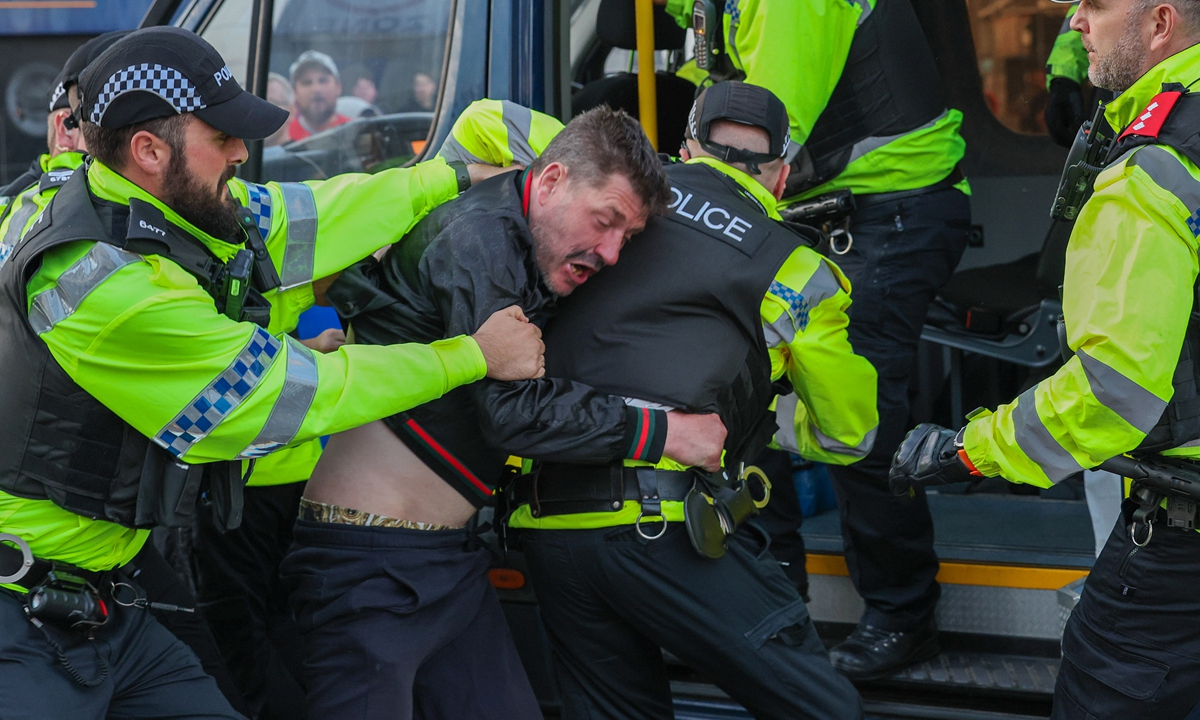
Photo: CFP
Recently, many large shopping malls in Hong Kong have made exceptions by remaining open late at night so that residents can watch live broadcasts of the Paris Olympic Games on the shopping malls' big screens. Although most households have TVs, and the government has specially purchased the TV broadcast rights for various TV stations to broadcast the games, many residents still like to gather in shopping malls to cheer for the national team and the Hong Kong team. This warm atmosphere cannot be matched at home. What's more important is the stable environment of Hong Kong society. Even though most games are held late at night, it does not dampen the enthusiasm of the people.
During breaks between the games, the TV station would broadcast news. The news that attracted more public attention was the most serious riots in more than 10 years that were taking place in many places across the UK. In order to suppress the protesters, the British government has employed iron-handed measures and urgently published the national violence prevention and reduction standard to mobilize police forces to curb the wave of demonstrations. In the past few days, more than 500 people have been arrested and more than 100 police officers have been injured. British Prime Minister Keir Starmer said, "It's not protest. It's not legitimate. It's crime and violent disorder. An assault on the rule of law and the execution of justice." TV footage of demonstrators rushing into supermarkets, throwing Molotov cocktails at police cars, and British police forcefully suppressing them aroused public discussion.
In 2019, separatists in Hong Kong smashed the Legislative Council, the Hong Kong Police Headquarters, and the Liaison Office of the Central People's Government in the Hong Kong Special Administrative Region. Many shop windows and signboards displaying the word "China" on the streets were smashed or damaged. Hong Kong police maintained social order in accordance with the law and prevented rioters from damaging public facilities, demonstrating their tenacious will to stop violence and chaos.
At that time, some British politicians and media blatantly distorted facts, sympathized with violence, and frequently pointed their fingers at and interfered in Hong Kong affairs. For example, the UK Parliament expressed its support for "the right to peaceful protest." Then British Foreign Secretary Dominic Raab made several irresponsible statements to grossly interfered in Hong Kong affairs. The Guardian even carried out false reports, cutting out "rioters grabbing guns of the police" but keeping the scene of "police officers attacking rioters," in an attempt to stigmatize the Hong Kong police.
Now that Hong Kong residents see the riots in the UK and the UK government's strong response, they will naturally make a comparison: Why did the UK government regard the riots in its own country as a serious concern and rush to respond, but regarding the riots in Hong Kong, it chose to support the thugs? Why does the UK show no mercy when it comes to safeguarding its own social stability, but want Hong Kong to become more chaotic?
Obviously, this is a "double standard" held by the UK government and reflected across public opinion. If there were still some people in Hong Kong who were deceived at that time and could not see clearly the true face of the "black violence" and the sinister intentions of the British and American forces behind it, now they have realized that Downing Street actually knew it well, and that the conditions that society is stable, and law and order is maintained and people live and work in peace are the foundation for the healthy development of a country or region. However, Downing Street has interfered in China's internal affairs and Hong Kong affairs based on its deep-rooted colonial mentality and a "lecturing" mind-set. Its "double standard" has been fully exposed.
What is even more intriguing is the current situation of Hong Kong "yellow ribbons," referred to as anti-government protesters, who immigrated to the UK. In recent years, some "yellow ribbons" who had participated in the protests in 2019 gave up their jobs in Hong Kong, sold their houses, abandoned their families and moved to the UK. They had to lower their expectations for their jobs and incomes, and many were even faced with unemployment. In the recent anti-immigration riots in the UK, thugs attacked hotels and places where immigrants stay, making these "yellow ribbons" feel unprecedented fear. Some lamented on social media that they would be discriminated against in the UK, and they didn't expect that this anti-immigration riot would affect Hong Kong immigrants.
As for those UK politicians and media commentators, they may have long forgotten how they supported those engaged in the "black violence" in Hong Kong five years ago. What they are now more concerned about is probably how the UK can get out of the predicament as various economic and social problems are getting worse. No one has a proper plan, but one thing is certain, that is, the UK side should correct its mentality, face the reality that Hong Kong has long returned to China, stop interfering in Hong Kong affairs, and at the same time reflect on itself and not engage in "double standard."
The author is a Hong Kong-based media professional. opinion@globaltimes.com.cn




